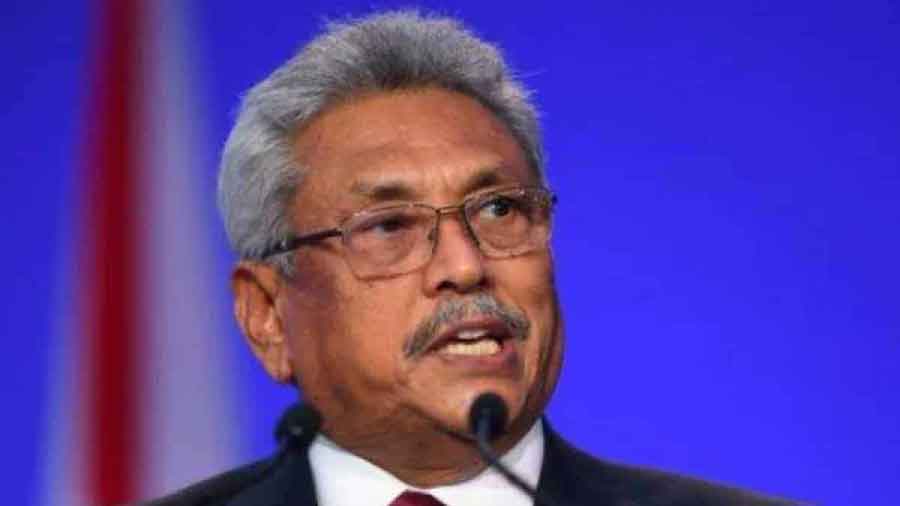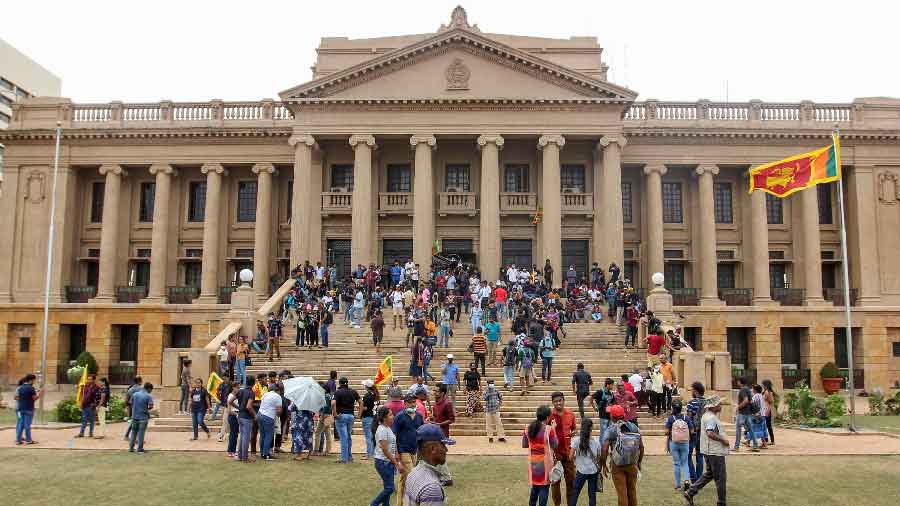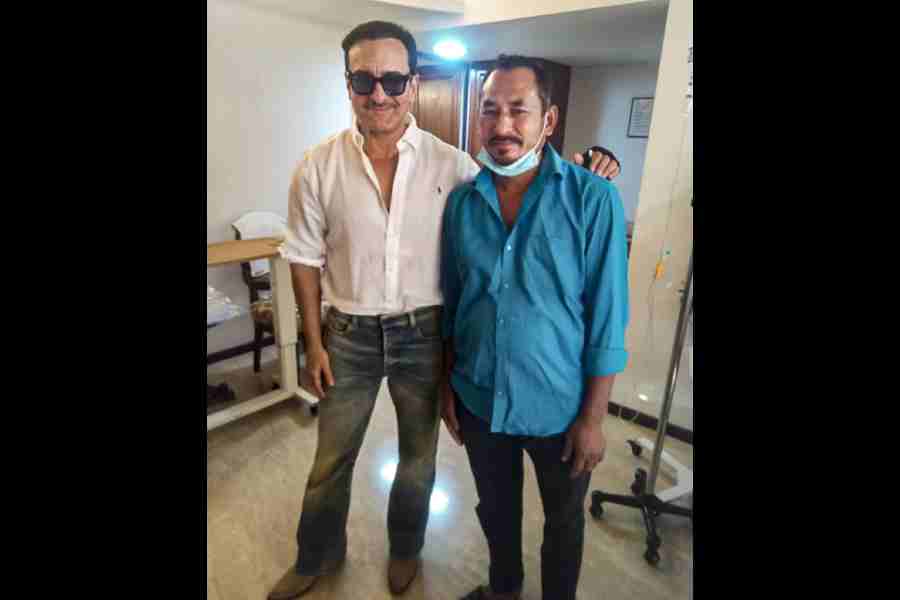Sri Lanka’s Opposition parties on Sunday decided to form an all-party interim government, a day after President Gotabaya Rajapaksa and Prime Minister Ranil Wickremesinghe agreed to resign following the storming of their residences by demonstrators protesting mishandling of the country’s worst economic crisis.
The leaders of the protest movement said they would occupy the residences of the President and the Prime Minister until they finally quit office.
Opposition parties on Sunday held talks to seek ways to steer the country forward.
“We agreed in principle to form a government of unity with all parties’ participation for an interim period,” Wimal Weerawansa of the ruling Sri Lanka Podujana Peramuna (SLPP) party’s breakaway group said. “This will be a government where all parties are represented.”
Vasudeva Nanayakkara, another leader of the SLPP’s breakaway group, said they need not wait for Rajapaksa’s resignation.
Rajapaksa will quit on July 13, while Wickremesinghe also said he would step down to allow an all-party interim government to take over, according to the Speaker of the parliament.
Rajapaksa has not been seen in public since Friday and has not directly said anything about resigning. Wickremesinghe’s office has said he would quit, but neither he nor Rajapaksa could be contacted.
The main Opposition Samagi Jana Balawegaya party said it had held extensive internal discussions.
“We aim for an interim government of all parties for a limited period and then go for a parliamentary election,” SJB general secretary Ranjith Madduma Bandara said.
The leaders of political parties represented in the parliament are to meet on Monday afternoon to discuss the convening of the House for the transition of power for a new government.
Speaker Mahinda Yapa Abeywardena, 76, a close ally of the Rajapaksa family, is now the prime candidate to be interim President.
“The constitutional position is that if the President resigns and there is no Prime Minister, the Speaker of the parliament can act as President for a period of one month,” said Jayadeva Uyangoda, a professor of political science at the University of Colombo.
The acting President will have a month to organise the election of a President from among MPs. The winner will complete the two years left in Rajapaksa’s term before elections are due, analysts said.
Uyangoda said the new President and the new Prime Minister, who too will come from the parliament, would be walking into a “crisis trap”. He said the new leaders would struggle to fulfil any promises because of the daunting economic crisis.
“The entire political class has also lost public trust,” he said. There is a “contradiction between the political class and the politically awakened citizens — unless this contradiction is resolved constructively, we will continue to see instability”.
US secretary of state Antony Blinken said any government in power would have to “work quickly to try to identify and implement solutions that will bring back the prospect of long-term economic stability, address the Sri Lankan people’s discontent, which is so powerful and palpable”.
Blinken said at a news conference in Bangkok: “We would urge the Sri Lankan parliament to approach this with a commitment to the betterment of the country, not any one political party.”
The challenge
The political chaos could complicate efforts to pull Sri Lanka out of its worst economic crisis in seven decades, triggered by a severe shortage of foreign currency that has stalled imports of essentials such as fuel, food and medicines.
The International Monetary Fund (IMF), which has been in talks with the Sri Lankan government for a possible $3-billion bailout, said on Sunday it was monitoring the events closely.
“We hope for a resolution of the current situation that will allow for resumption of our dialogue on an IMF-supported programme,” the global lender said.
Sri Lanka needs $6 billion through the end of the year to buy fuel and other essentials. The question is, where that money will come from.
One of its most steadfast patrons, India, has already provided $3.8 billion in credit and loans, which Sri Lanka has burned through in recent months. In meetings held in Colombo, Indian officials have expressed willingness to keep supporting the country, but it’s unclear just how much more India will do.
The situation has grown so desperate that Sri Lanka has asked President Vladimir V. Putin of Russia for a credit line to buy fuel. Government delegations were even dispatched abroad to meet anyone who might be able to help, including charities in Qatar.
China, a long-time ally of the ruling Rajapaksa family, has largely kept its distance.
Fuel shipments from India occasionally ease the long lines at Sri Lankan gas stations.
Officials have appealed to foreign tourists to return to Sri Lanka’s pristine beaches and lush mountains, hoping that desperately needed hard currency will trickle in. But the political turmoil, and the logistical nightmare of transportation and electricity cuts, is making that appeal a hard sell.
Despite the chaos, the President’s office was still working on Sunday. In a statement, the office said the President had instructed officers to unload a 3,700-tonne shipment of cooking gas from a ship that arrived on Sunday.
At the main protest site in Colombo, playwright Ruwanthie de Chickera, a leader of the protests, insisted: “The President has to resign, the Prime Minister has to resign and the government has to go.”
Flanked by other leaders helping coordinate the movement against the government, she said the crowds would not move out of the official residences of the President and Prime Minister until then.
Frustration with the economic crisis had boiled over on Saturday when a huge crowd of protesters surged past armed guards into the presidential palace and took it over. Furniture and artefacts were smashed, and some took the opportunity to frolic in its swimming pool.
A part of Wickremesinghe’s private residence in an affluent Colombo suburb lay in ruins after protesters attacked it and set it on fire late on Saturday. Three people have been arrested.
Neither Rajapaksa nor Wickremesinghe were in their residences when the buildings were attacked.
Wickremesinghe, a six-time Premier, was appointed in May after Rajapaksa’s brother, Mahinda Rajapaksa, quit as Prime Minister in an attempt to appease protesters who blamed the economic crisis on the brothers and their allies.
Pope message
Pope Francis on Sunday told Sri Lanka’s leaders “not to ignore the cry of the poor and the needs of the people” and appealed for peace in the country.
Speaking from St Peter’s Square for his Sunday Angelus message, the Pope expressed solidarity with the people of Sri Lanka who he said “continue to suffer from political and economic instability”.
“Together with the bishops of the country, I renew my appeal for peace,” the Pope said.











